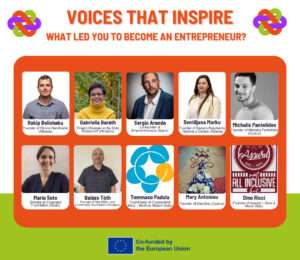Article by Synthesis
Through an enlightening series of Focus Group Cafés held between March and April 2025 across Spain, Cyprus, Hungary, Italy, and Albania, the CREASSE project brought together diverse voices to explore the challenges, potentials, and innovative pathways of the Social and Solidarity Economy (SSE) in rural settings, in partner countries. These participatory dialogues brought together stakeholders, social entrepreneurs, potential social entrepreneurs, local authorities and other interested parties.
While the sociopolitical landscapes and the degree of the ecosystems’ maturity varies among these five countries, several recurring challenges, insights and opportunities emerged, making it possible for the partners to shape their following steps.
Common Challenges Across Borders
- Bureaucracy and Legal Ambiguity
Across all five countries, participants cited heavy administrative burdens, unclear legal frameworks, and fragmented policy environments as persistent barriers to SSE growth. In Italy and Albania, the lack of formalized, participatory structures with decision-making power was noted as a major hindrance. Cyprus and Hungary echoed similar frustrations, especially regarding the difficulties of registering social enterprises and the absence of enabling fiscal incentives. - Limited Access to Finance
In every context, financial insecurity and limited access to finance was a pressing issue. Participants highlighted a lack of tailored funding opportunities—especially for early-stage or migrant-led initiatives. Albania raised the need for ethical banking models, while Hungary proposed mentorship-based funding platforms and digital crowdfunding solutions. - Low Public Awareness and Skills Gaps
The invisibility of SSE in public discourse and a lack of business/digital skills among aspiring social entrepreneurs was a recurring theme. In Cyprus and Albania, this was compounded by limited engagement from academia and an absence of structured training programs. Italy and Hungary also called for more consumer education to distinguish the value of ethical, locally rooted products. - Rural-Specific Challenges
Participants from rural regions in all countries raised issues such as infrastructure gaps, depopulation, youth outmigration, and poor access to services like healthcare and education. These factors limit both the market potential and human resources available for SSE.
Emerging Opportunities and Strengths
Despite the challenges, the focus groups revealed a landscape rich with opportunities and collective resilience:
- Cultural and Natural Assets: Countries like Albania and Spain emphasized the economic potential of traditional crafts, agriculture, and eco-tourism. Italy showcased the power of experiential tourism, linking consumers directly to producers.
- Growing Interest in Social Innovation: Youth in Cyprus and Hungary are increasingly drawn to socially responsible entrepreneurship, particularly with access to free digital tools and online marketplaces.
- EU Momentum and Local Enthusiasm: The EU-wide push for social economy is helping build political traction, particularly in places like Spain and Cyprus where recent legislation on SSE offers a new policy window.
- Community Spirit: Many participants, especially in Hungary and Albania, highlighted collaborative values, intergenerational solidarity, and women’s leadership as untapped forces for change.
Proposed Solutions and Collaborative Visions
An important aspect that was explored through the focus groups in partner countries was the emphasis on collaboration and practical action. Key suggestions arising from the participants in focus groups included:
- Co-creating National Strategies: Participants in Cyprus called for a strategy involving ministries, municipalities, and SSE actors, while Hungary emphasized the need for unified legal frameworks and rural investment.
- Capacity Building: Suggestions ranged from multilingual, practical entrepreneurship workshops for migrants in Cyprus, to participatory youth labs in Hungary and school-based labs in Albania.
- New Collaborative Models: Living Labs, social procurement schemes, and informal “morning coffee” meetups were proposed to nurture grassroots innovation and intersectoral collaboration.
The CREASSE Focus Group Cafés have demonstrated that SSE is a force to be reckoned with and an alternative to traditional entrepreneurial activity to support rural development. Participants across the five countries expressed strong enthusiasm to stay engaged, continue collaborating, and advocate for structural changes that will unlock the full potential of SSE in rural areas.
As the CREASSE project continues, the results of the focus groups will be used to form a common report which will inform the subsequent steps of the project and the creation of the Toolbox for SSE Entrepreneurs and Practical Handbook for Facilitators.





